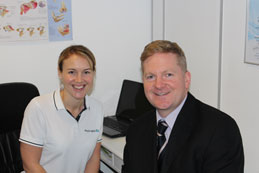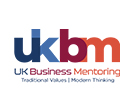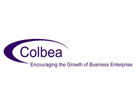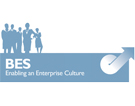- Resources for mentees
- Useful information
- Case studies
- Construction & property
- Consumer products
- Creative services
- Education & training
- Hotels & restaurants
- IT & telecoms
- Manufacturing
- Professional services
- Renewable energy
- Resources for mentors
- Other resources
- Regional events
- Best Practice Toolkit

Physio-logical
Physio-logical is a physiotherapy, back pain, sports injury and acupuncture clinic providing high quality, hands on and patient focussed physiotherapy for Portsmouth, Havant, Basingstoke and Hampshire.
Mentee: Natalie Stephenson
Mentor: Philip Bailey
About Natalie:
“I am a fully qualified chartered physiotherapist and acupuncturist with over 9 years experience graduating from Brunel University in 2003.
My company is Physio-logical based at Active4less, New Lane, Havant, PO9 2NL and also within Regus, Chineham Business Park, Basingstoke, RG24 8AL.
Physio-logical is a physiotherapy, back pain, sports injury and acupuncture clinic providing high quality, hands on and patient focussed physiotherapy for Portsmouth, Havant, Basingstoke and Hampshire.
At Physio-logical we relieve pain, restore normal movement and functions to help return your body to its natural state by carrying out a full in-depth analysis of problems and underlying causes to help identify the appropriate treatment.
We also run a ‘PRIMETIME’ class - Functional Fitness for the Mature Person at our Havant Clinic
Designed to reduce your chances of falling by improving your core stability with general fitness exercises.
Focusing on:
- balance
- muscle strength
- general fitness
- general well-being
The classes are specially structured to improve core strength, balance, coordination, flexibility and prevent muscle loss. This will then improve your quality of life as your body does not deteriorate because of age, it deteriorates because of lack of use”
In her application Natalie expressed the need for help from a mentor on three issues:
- time management
- marketing and how to grow the business
- When to take on support to help with Accountancy, Marketing and Admin
Philip, her mentor, and Natalie discussed each of the above areas to see which was most important and critical at the first meeting. Part of the problem was that Natalie was doing everything, which is what you do when you start a business and it grows. She needed to look for external support and also how to use her time between different locations.
Philip and Natalie worked on how she could get someone to support her with bookkeeping and basic accountancy and chasing up some late payers. This is now working well, and the work with Philip gave her the confidence to approach the right people and ask the right questions and to be clear what she wanted.
Having freed up some of her time, the next area was where to focus her time, and look to get other part time staff to take on more duties and find out if they were willing to take on more hours. This would give Natalie more time to work on business development, and to give her cover for holidays.
With Philip she was able to discuss the individuals that she could approach and look at the type of skills she needed to recruit as the business grew. They also discussed how much time she spent in each location, as it was clear that she was spending less time in an areas where there was clearly more growth potential. Again, a plan was devised to ensure she was not spending hours in the wrong location.
Natalie is now exploring telephone services to see if this will help:
- allow her more time
- her to not lose bookings, by someone remotely booking appointments, and
- ensure that calls get answered even when she is working with clients.
So she is looking to set up a pilot to test if this is cost effective and works.
Philip and Natalie have also explored where the business originates from, and how much time per month she is spending on promoting the business. She makes good use of local PR where she writes advice articles and also she runs clinics at local health clubs and sports clubs. They are now reviewing the client base and seeing which of these is most effective and which she can do more on. Also the type of sports clubs to visit, the age profile and potential opportunities with each.
Without Philip to challenge and encourage, the rate of progress would have been a lot slower, and the meetings help confirm what the next actions and steps are and gives the mentee more confidence and focus in each area.
The key in having a mentor is to bounce ideas around. They are not there to take over, but to reconfirm, and bring new ideas and thoughts. Natalie is clear about the benefits of having a mentor:
“It stops me working in the business, and the meetings give me time to work on the business. It helps me decide where I want to be in the future, and to plan accordingly rather then just focusing on the day to day tasks.
By having the meetings, you can keep track of progress and bounce ideas off your mentor and it encourages you to try different strategies and discuss them first”
From Philip’s perspective a mentor can ask questions to challenge assumptions. It is an environment in which the business owner can explore different options and ideas in safety. You can discuss the benefits and pitfalls to each idea, and then focus on the next steps to help the business achieve its overall goal. Not all ideas will work so the mentor can review progress, and help the business owner to decide which areas to focus on, and which areas are not worth pursuing.
The key to a successful mentor relationship is having:
- an open honest dialogue
- good understanding of what the overall business goals and personal goals of the individual are
- the chance to explore the areas that the business wants to cover and let the business owner set their agenda, but allow the mentee to be challenged around some assumptions they may have made, and let them explore other options, which they may not have considered.
Many businesses focus on the day to day challenges, but they must also take time to look at where they want to be in 5+ years. Are they looking to reach a turnover target, profit target, are they looking to sell the business? If so who would they look to sell to and what would the business need to look like to a potential purchaser and are what they are doing today going to achieve that?
As regards the future, Philip and Natalie are planning to look at strategic goals of size of turnover, in say 3-5 years, and what that means in terms of staff, numbers of clients, and number of locations. Again, this is why Natalie finds the sessions helpful as she would not have had the ability to plan in such a way if she did not have a mentor. The meetings encourage her to step away from the daily routine and think strategically about the business.
For more background on the business: www.physio-logical.net







